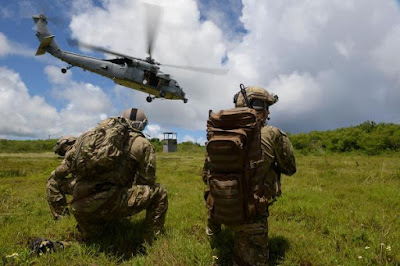Decolonization in the Caribbean #17: Militarization and Decolonization

At this year's Regional Seminar for the Committee of 24 in St. Vincent and the Grenadines, attendees were treated to two presentations by experts on decolonization from the UN perspective. I'll discuss both presentations through my "Decolonization in the Caribbean" posts, but today I wanted to focus on the remarks from Dr. Carlyle Corbin, from the US Virgin Islands, who is a longtime ally with Guam and the Chamorro people in their struggle for self-determination. He offered a number of recommendations that the Committee could take up in terms of moving ahead with its mission of eradicating colonialism from the world and assisting the remaining non-self-governing territories. What is refreshing in terms of the seminar overall is the way it mixes scholars and experts with diplomats or government reps. The debate or discussions between country representatives and committee members tends to move in familiar and sometimes frustrating directions. Regardless of what is t




